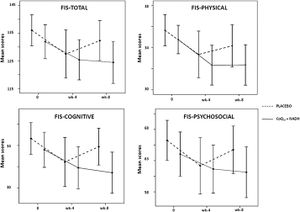Coenzyme Q10
Coenzyme Q10 (CoQ10) or ubiquinone is found in the mitochondria and as a component of the electron transport chain plays an important role in aerobic respiration.
Evidence[edit | edit source]

A trial of 50 mg CoQ10 taken with 5mg NADH twice daily for eight weeks found improvements in exercise performance/less exercise intolerance and a less fatigue and improved cognitive function, but those in the placebo group had better sensory and affective pain scores.[1]
Plasma CoQ10 was found to be significantly lower in ME/CFS patients than in normal controls and correlated with symptom severity.[2] A literature review found that CoQ10 was marginally deficient in people with chronic fatigue syndrome.[3]
Ubiquinol-10 supplementation can improve autonomic nervous function and cognitive function in chronic fatigue syndrome.[4]
Notable studies[edit | edit source]
- 2000, Nutritional Strategies for Treating Chronic Fatigue Syndrome[3] (Full text)
- 2009, Coenzyme Q10 deficiency in myalgic encephalomyelitis/chronic fatigue syndrome (ME/CFS) is related to fatigue, autonomic and neurocognitive symptoms and is another risk factor explaining the early mortality in ME/CFS due to cardiovascular disorder[2] (Abstract)
- 2016, Ubiquinol-10 supplementation improves autonomic nervous function and cognitive function in chronic fatigue syndrome[4] (Abstract)
- 2016,Effect of coenzyme Q10 plus nicotinamide adenine dinucleotide supplementation on maximum heart rate after exercise testing in chronic fatigue syndrome – A randomized, controlled, double-blind trial[1] - (Full text)
Learn more[edit | edit source]
See also[edit | edit source]
References[edit | edit source]
- ↑ 1.0 1.1 Castro-Marrero, Jesus; Sáez-Francàs, Naia; Segundo, María Jose; Calvo, Natalia; Faro, Mónica; Aliste, Luisa; Fernández de Sevilla, Tomás; Alegre, José (August 2016). "Effect of coenzyme Q10 plus nicotinamide adenine dinucleotide supplementation on maximum heart rate after exercise testing in chronic fatigue syndrome – A randomized, controlled, double-blind trial". Clinical Nutrition. 35 (4): 826–834. doi:10.1016/j.clnu.2015.07.010. ISSN 0261-5614.
- ↑ 2.0 2.1 Maes, M; Mihaylova, I; Kubera, M; Uytterhoeven, M; Vrydags, N; Bosmans, E (2009), "Coenzyme Q10 deficiency in myalgic encephalomyelitis/chronic fatigue syndrome (ME/CFS) is related to fatigue, autonomic and neurocognitive symptoms and is another risk factor explaining the early mortality in ME/CFS due to cardiovascular disorder", Neuro Endocrinology Letters, 30 (4): 470–476, PMID 20010505
- ↑ 3.0 3.1 Werbach, Melvyn R. (May 2000). "Nutritional Strategies for Treating Chronic Fatigue Syndrome" (PDF). Alternative Medicine Review. 5 (2): 93–108.
- ↑ 4.0 4.1 Fukuda, S; Nojima, J; Kajimoto, O; Yamaguti, K; Nakatomi, Y; Kuratsune, H; Watanabe, Y (April 29, 2016), "Ubiquinol-10 supplementation improves autonomic nervous function and cognitive function in chronic fatigue syndrome", BioFactors (Oxford, England), doi:10.1002/biof.1293, PMID 27125909

